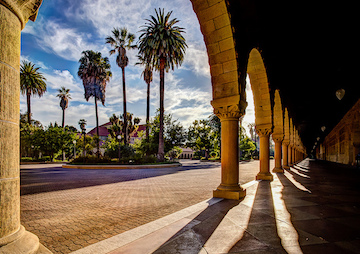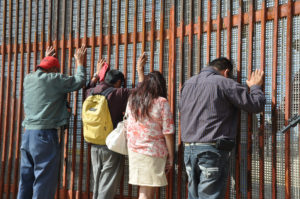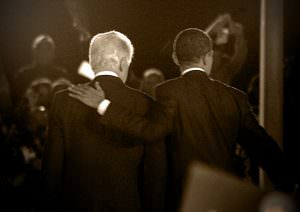Will the Millennial Movement Rebuild the Ivory Tower or Be Crushed by It?
College administrators tend to shine bright lights on the politics of student protesters that can be absorbed into the system's business model, while ignoring or downplaying students' more structural or economically challenging demands. The Stanford University campus in California. (Robbie Shade / CC-BY-2.0)
1
2
3
The Stanford University campus in California. (Robbie Shade / CC-BY-2.0)
1
2
3

The Stanford University campus in California. (Robbie Shade / CC-BY-2.0)
During the past academic year, an upsurge of student activism, a movement of millennials, has swept campuses across the country and attracted the attention of the media. From coast to coast, from the Ivy League to state universities to small liberal arts colleges, a wave of student activism has focused on stopping climate change, promoting a living wage, fighting mass incarceration practices, supporting immigrant rights, and of course campaigning for Bernie Sanders.
Both the media and the schools that have been the targets of some of these protests have seized upon certain aspects of the upsurge for criticism or praise, while ignoring others. Commentators, pundits, and reporters have frequently trivialized and mocked the passion of the students and the ways in which it has been directed, even as universities have tried to appropriate it by promoting what some have called “neoliberal multiculturalism.” Think of this as a way, in particular, of taming the power of the present demands for racial justice and absorbing them into an increasingly market-oriented system of higher education.
In some of their most dramatic actions, students of color, inspired in part by the Black Lives Matter movement, have challenged the racial climate at their schools. In the process, they have launched a wave of campus activism, including sit-ins, hunger strikes, demonstrations, and petitions, as well as emotional, in-your-face demands of various sorts. One national coalition of student organizations, the Black Liberation Collective, has called for the percentage of black students and faculty on campus to approximate that of blacks in the society. It has also called for free tuition for black and Native American students, and demanded that schools divest from private prison corporations. Other student demands for racial justice have included promoting a living wage for college employees, reducing administrative salaries, lowering tuitions and fees, increasing financial aid, and reforming the practices of campus police. These are not, however, the issues that have generally attracted the attention either of media commentators or the colleges themselves.
Instead, the spotlight has been on student demands for cultural changes at their institutions that focus on deep-seated assumptions about whiteness, sexuality, and ability. At some universities, students have personalized these demands, insisting on the removal of specific faculty members and administrators. Emphasizing a politics of what they call “recognition,” they have also demanded that significant on-campus figures issue public apologies or acknowledge that “black lives matter.” Some want universities to implement in-class “trigger warnings” when difficult material is being presented and to create “safe spaces” for marginalized students as a sanctuary from the daily struggle with the mainstream culture. By seizing upon and responding to these (and only these) student demands, university administrators around the country are attempting to domesticate and appropriate this new wave of activism.
In the meantime, right-wing commentators have depicted students as coddled, entitled, and enemies of free speech. The libertarian right has launched a broad media critique of the current wave of student activism. Commentators have been quick to dismiss student protesters as over-sensitive and entitled purveyors of “academic victimology.” They lament the “coddling of the American mind.” The Atlantic’s Conor Friedersdorf has termed students “misguided” in their protests against racist language, ideas, and assumptions, their targeting of “microaggression” (that is, unconscious offensive comments) and insensitivity, and their sometimes highly personal attacks against those they accuse. One of the most vocal critics of the new campus politics, the Foundation for Individual Rights in Education, argues that such rampant “liberalism” and “political correctness” violate academic freedom and freedom of speech. (In this, they are in accord with the liberal American Civil Liberties Union. Free speech advocates Daphne Patai and the ACLU’s Harvey Silvergate, for example, bemoan a new diversity requirement at the University of Massachusetts for its “politicization of education.”)
In a response that, under the circumstances, might at first seem surprising, college administrators have been been remarkably open to some of these student demands — often the very ones derided by the right. In this way, the commentators and the administrators have tended to shine a bright light on what is both personal and symbolic in the new politics of the student protesters, while ignoring or downplaying their more structural and economically challenging desires and demands.
The Neoliberal University
University administrators have been particularly amenable to student demands that fit with current trends in higher education. Today’s neoliberal university is increasingly facing market pressures like loss of state funding, privatization, rising tuition, and student debt, while promoting a business model that emphasizes the managerial control of faculty through constant “assessment,” emphasis on “accountability,” and rewards for “efficiency.” Meanwhile, in a society in which labor unions are constantly being weakened, the higher education labor force is similarly being — in the term of the moment — “flexibilized” through the weakening of tenure, that once ironclad guarantee of professorial lifetime employment, and the increased use of temporary adjunct faculty.
Your support matters…Independent journalism is under threat and overshadowed by heavily funded mainstream media.
You can help level the playing field. Become a member.
Your tax-deductible contribution keeps us digging beneath the headlines to give you thought-provoking, investigative reporting and analysis that unearths what's really happening- without compromise.
Give today to support our courageous, independent journalists.





You need to be a supporter to comment.
There are currently no responses to this article.
Be the first to respond.